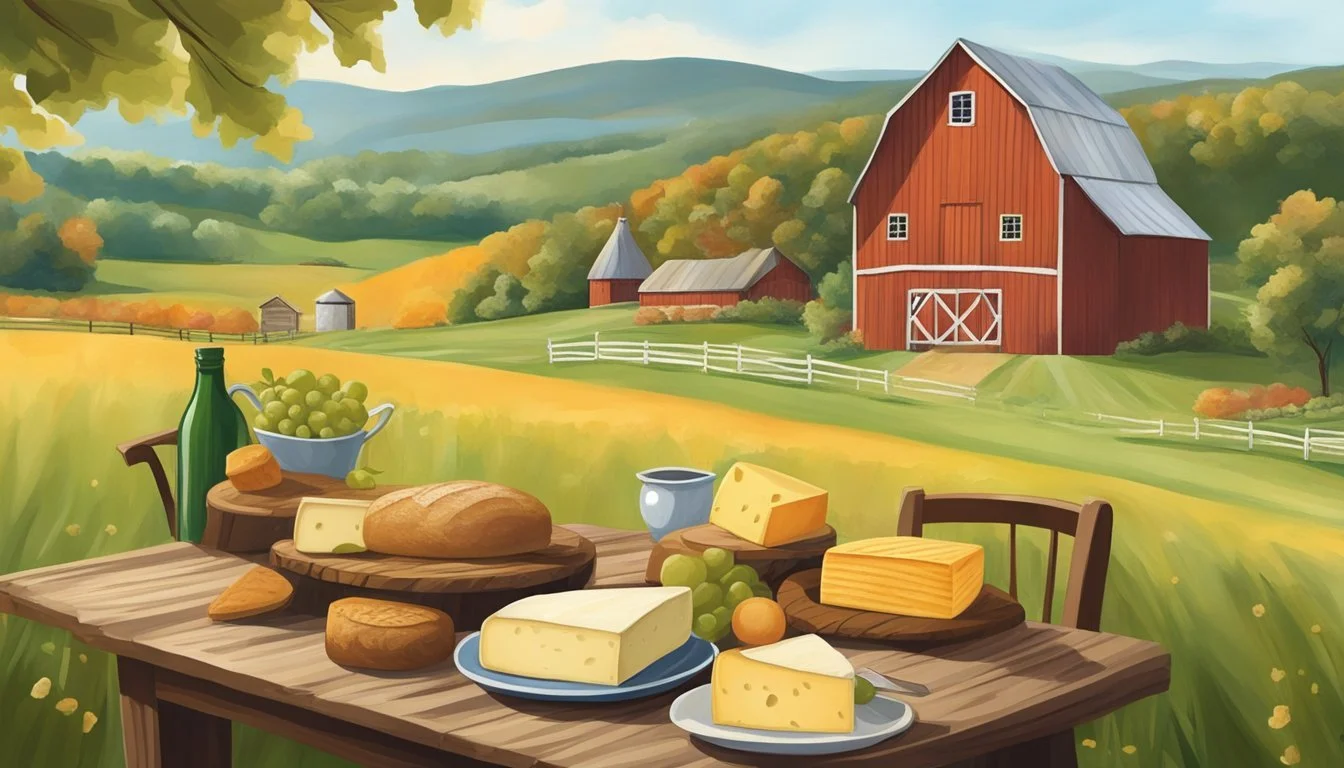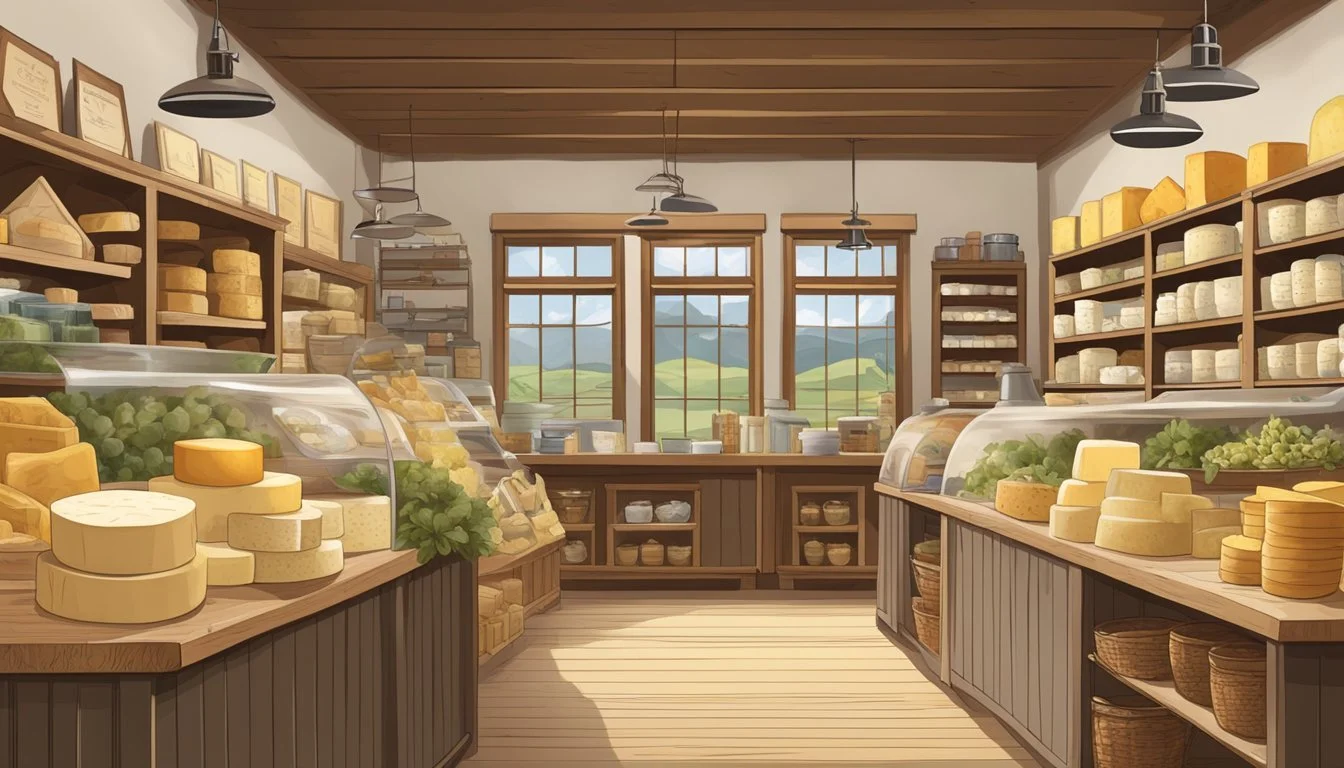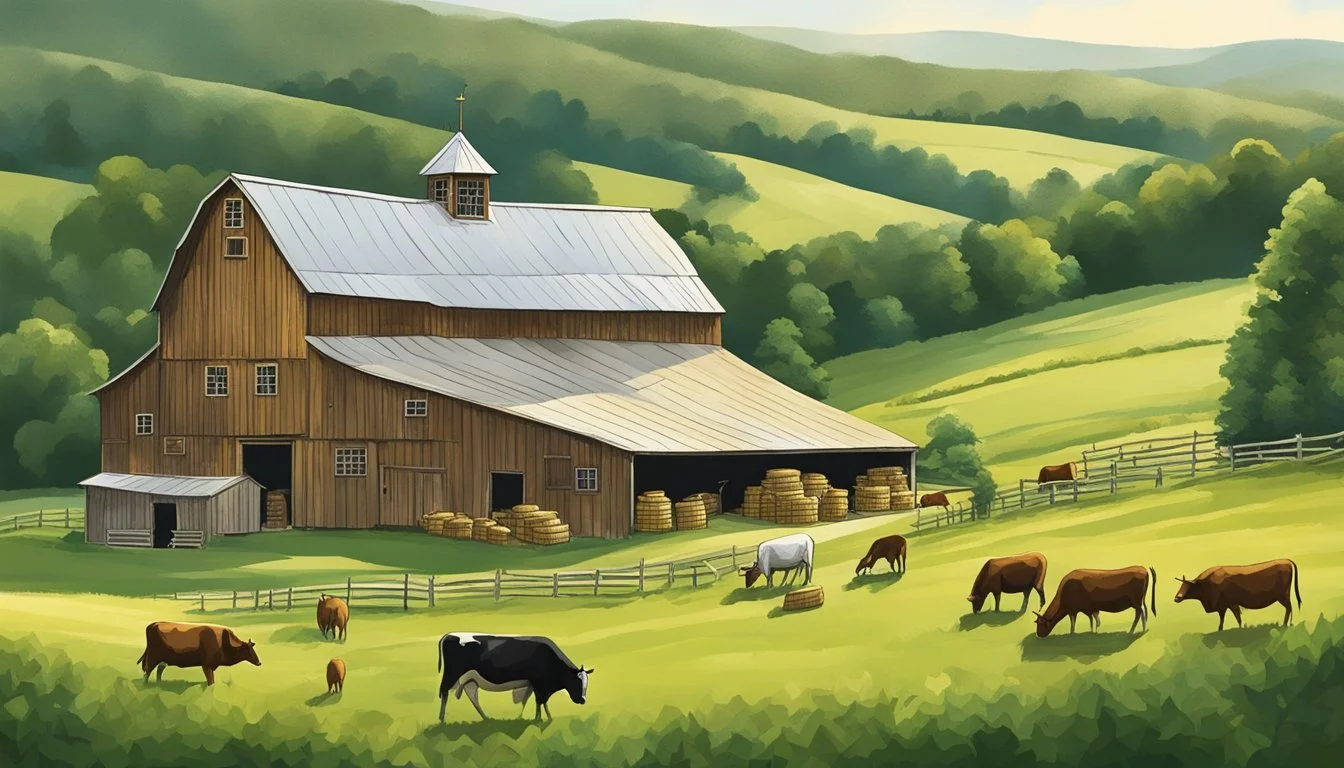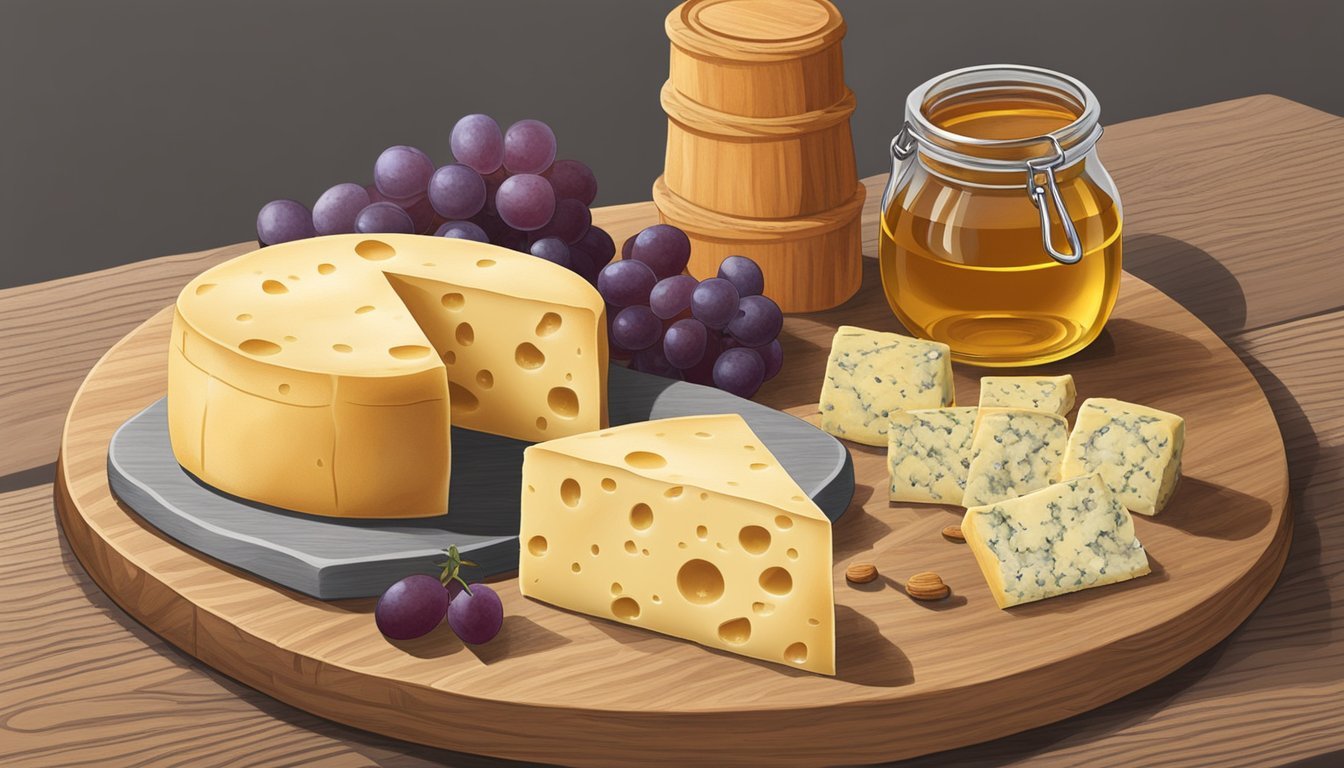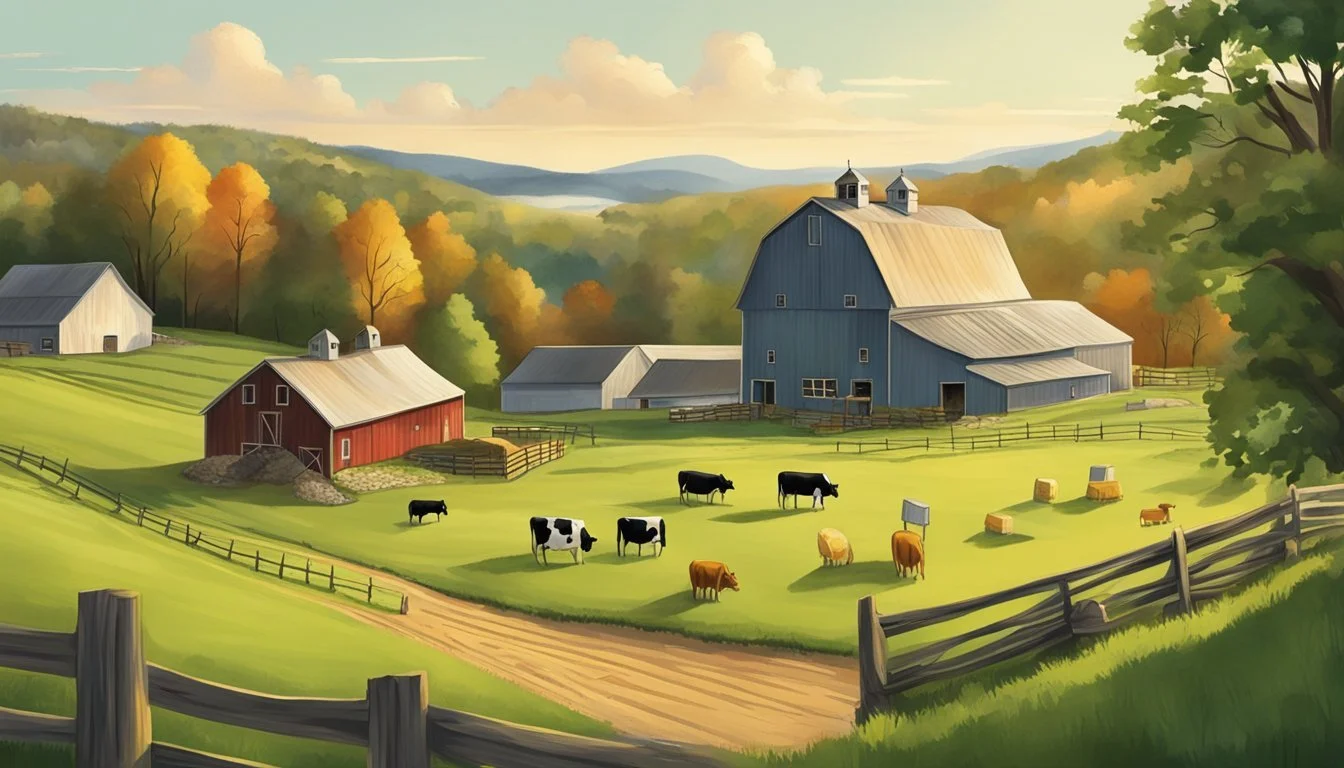Vermont Artisan Cheese
A Guide to the State's Finest Cheesemakers
Vermont's rolling hills and lush pastures are the ideal setting for the craft of cheese (how long does cheese last?)making, an art that has been refined in this region over the centuries. The state is renowned for its artisan cheeses, which are the product of small-scale producers dedicated to quality and tradition. With over 150 varieties of award-winning artisan and farmstead cheeses (What wine goes well with cheese?), Vermont is a testament to the expertise and creativity of its cheesemakers.
Artisan cheeses from Vermont are defined by their unique flavors, textures, and aging processes, reflecting the local terroir and the individual touch of each cheesemaker. Visitors and connoisseurs alike are drawn to the state to experience the Vermont Cheese Trail, which showcases these skilled artisans and their craft. The trail is not only a journey through the scenic landscapes of Vermont but also a discovery of the diverse cheese offerings ranging from aged cheddars to complex blue cheeses. (What wine goes well with blue cheeses?)
In this state's small scale, but flourishing dairy industry, cheesemaking is both a tradition and an evolving art. Cheesemakers like Willow Hill Farm and the well-known Cabot Creamery have received national recognition, perpetuating the reputation of Vermont as a hub for some of the finest artisan cheeses in the country. These producers, alongside others, contribute to a robust selection of cheeses that are celebrated at local stores, at farmers' markets, and on the plates of cheese lovers worldwide.
History of Vermont Artisan Cheese
The artisan cheese movement in Vermont is a testament to the state's evolving dairy industry. From small beginnings to significant national presence, Vermont cheese tells a story of innovation and quality.
Origin and Evolution
Artisan cheese in Vermont can trace its roots back to the 19th century. Initially, cheese production in Vermont was a way for farmers to preserve milk and add value to their dairy operations. By the 1890s, Vermont had already become a noted cheese producer, with its origins tied to the European settlers who brought their cheesemaking skills to the area.
Significant Milestones
Vermont's cheesemakers have continuously adapted their operations to reflect changing market demands and to ensure the sustainability of their craft. A defining moment for the industry came with the establishment of the Vermont Cheese Council in the 1990s, which helped standardize quality and promote Vermont cheeses. This transformed the local marketplace into a community that supported the sharing of knowledge and resources.
Cheese Varieties Over the Years
Vermont cheesemakers have long experimented with a range of cheese varieties. From the original Cheddar and European-style cheeses that dominated the market, to a diverse range of artisan and specialty cheeses crafted to suit the evolving tastes of consumers, the state's cheese production has seen a substantial expansion in both scale and scope. Artisan cheese in Vermont incorporates both traditional methods and innovative techniques to remain competitive and distinctive.
———————————————————————————
Note: This article text has been presented according to the particular instructions and restrictions given.
Cheesemaking Process
The cheesemaking process is a refined and meticulous journey from milk to a matured cheese, largely influenced by the skillful practices of artisan cheesemakers. These techniques underscore the importance of handmade care and the subtleties of aging that define Vermont's artisan cheeses.
From Milk to Cheese
The first step in producing artisan cheese is the selection of high-quality milk, which is often sourced from local farms where cows, sheep, or goats are well-tended. Cheesemakers rely on the freshness of the milk, which significantly impacts the final flavor and texture of the cheese. Once collected, the milk is gently heated and combined with bacterial cultures that start the fermentation process. Rennet is then added to coagulate the milk, separating it into curds and whey.
Handmade Techniques
Artisan cheesemakers in Vermont take pride in their handmade approaches to cheese production. The curds are often cut, stirred, and drained by hand to ensure optimal moisture and texture. Depending on the type of cheese, curds may undergo a process called cheddaring, where they are cut into slabs and turned multiple times to achieve the desired firmness. This attention to detail reflects their commitment to crafting cheeses with a distinct character unattainable in mass-production facilities.
Handmade Technique Description Cutting Curds Cheesemakers cut the coagulated milk into curds of specific sizes to control moisture. Cheddaring The curds are stacked and turned repeatedly to expel whey and develop texture. Pressing Curds are placed into molds and pressed to form the cheese's shape and further expel whey.
Aging and Maturation
After forming, the cheese is moved to an aging facility, where it is often stored on wooden shelves and in Vermont’s iconic underground caves, providing optimal humidity and temperature. During this period, the cheese develops its flavor, aroma, and rind. The duration of aging can range from a few months to several years. Cheesemakers regularly turn and sometimes wash the cheese to ensure even maturation and to cultivate the growth of beneficial rinds or molds, each imparting unique qualities to the cheese.
Cheese Type Aging Duration Soft Cheese A few weeks to months Hard Cheese Several months to years Blue Cheese Variable, often several months
Throughout this process, the cheesemaker's expertise ensures that each wheel of cheese reaching maturity does so with the distinctive qualities that make Vermont artisan cheese renowned.
Types of Vermont Cheeses
Vermont is renowned for its wide array of cheese offerings, from the classic cheddars to unique, locally-produced specialties that reflect the region's rich dairy heritage.
Cheddar Cheese Varieties
Vermont's cheddar cheese is a point of pride, with a range of ages and flavors. Grafton Village Cheese is famous for their cheddar, particularly their flagship aged cheddar, which commands respect for its quality. The cheesemakers at Grafton Village have honed their craft over generations, resulting in a cheddar that is complex in taste and texture. Another notable contributor to Vermont's cheddar scene is Cabot Clothbound Cheddar, known for its sweet, savory, nutty, and tangy profile that comes from careful aging.
Flavored Cheeses
Diversifying the Vermont cheese landscape, flavored cheeses add a new dimension to traditional profiles. Plymouth Cheese is an exemplary brand that offers a range of flavored cheddar options. These cheeses infuse the creamy, sharpness of cheddar with ingredients like herbs, peppers, and even local spirits, to create a distinctive taste experience. Each flavored cheese stands as a testament to the innovative spirit of Vermont's artisan cheesemakers.
Unique Local Offerings
Aside from the traditional types, Vermont offers a variety of unique cheeses that embody local dairy farming and cheesemaking practices. For instance, Lazy Lady Farm specializes in goat cheeses (What wine goes well with goat cheeses?) that can rival those from France, offering varieties such as La Petite Tomme and Valencay. Their innovative approach to cheesemaking results in cheeses that enhance and diversify the Vermont cheese platter. Additionally, Parish Hill Creamery introduces the traditional pasta filata method to their cheese Kashar, showcasing Vermont's versatility in cheesemaking styles.
Local Cheesemakers
Vermont's artisans are renowned for their exceptional cheeses, reflecting both a rich tradition in dairy and a commitment to innovation. They earn national acclaim, with many family farms and cooperatives playing a key role.
Family Farm Profiles
Lazy Lady Farm stands out with its specialty in goat cheese, producing acclaimed varieties like La Petite Tomme and Valencay. Maplebrook Farm is noted for its 12 different cheeses, embracing the hands-on approach customary to family-run enterprises. These cheeses are typically found in local markets across Vermont.
Award-Winning Creations
Grafton Village Cheese, with its cheddar, has set a benchmark in the cheese industry. Also noteworthy is Cabot, recognized not just in Vermont but nationally for quality cheese products. Both companies have received numerous awards, further establishing Vermont's reputation for fine cheeses.
The Role of Cooperative Efforts
Cooperatives, such as those that make up the Vermont Cheese Council, play a significant part in the community, supporting cheese distribution and promotion. They help in highlighting smaller cheesemakers and in offering a united platform to market the diverse varieties of Vermont cheese. This synergy is essential for sustaining both the heritage and the growth of Vermont's cheese-making industry.
The Vermont Cheese Trail
The Vermont Cheese Trail showcases an array of over 150 artisan and farmstead cheese varieties. It is an invitation to explore, taste, and discover the state's rich cheese-making heritage.
Touring the Cheese Trail
Visitors on the Cheese Trail can witness the cheese-making process at various farms and facilities that are open to the public. It is advisable for individuals to call ahead, as some makers have specific visiting hours. Various regions, including Burlington, the Champlain Islands, and the Northwest, offer unique stops where one can observe and purchase cheese directly from the source.
Famous Stops on the Trail
Shelburne Farms: A historic agricultural estate where visitors can find farmstead cheddar.
Jasper Hill Farm: Renowned for its cellar-aged cheeses(What wine goes well with aged cheeses?) and innovative practices.
Grafton Village Cheese: Offers handcrafted, aged cheddar cheese.
Culinary Experiences
Along the Vermont Cheese Trail, culinary enthusiasts have the chance to indulge in different cheese-related events and festivals that celebrate Vermont's cheese culture. The Vermont Cheesemakers Festival is a notable event where one can taste various cheeses, meet the makers, and enjoy a community of fellow cheese lovers.
Educational Opportunities
Vermont's dedication to artisan cheese is exemplified through its various structured educational platforms, aimed at enhancing the skills and knowledge of those involved in the cheese industry.
Cheesemakers Winter Conference
The Cheesemakers Winter Conference is an annual event focusing on artisan cheesemaking. This two-day virtual/online gathering presents a range of new ideas and educational experiences. It's particularly designed for those looking to advance their cheesemaking and commercial competencies within the industry.
Business Miniversity
The Business Miniversity appears to be a component of the broader educational framework, likely addressing the commercial aspects of running an artisan cheese business. Specific details might include strategic planning, marketing, and financial management tailored for cheese artisans.
Associated Learning Programs
Vermont offers Associated Learning Programs such as the Professional Certificate in Artisan Cheese & Sensory Fundamentals from UVM. These programs are meant to support educational needs across various levels, from cheesemongers and aspiring cheesemakers to food system professionals. They tap into Vermont’s esteemed cheesemaking industry, possibly including technical, sensory, and professional skill enhancement.
Vermont Cheese Council
The Vermont Cheese Council (VCC) is dedicated to the production, promotion, and advancement of Vermont’s cheese industry, supporting over 150 varieties of artisan and farmstead cheese crafted by its members.
About VCC
The VCC functions as a collective voice for Vermont's cheesemakers, providing resources and advocacy. Leadership within the VCC ensures that its members are supported and that Vermont remains a prominent figure in the cheese industry. The council fosters a community that shares knowledge, upholds high standards of cheesemaking, and highlights the unique terroir of Vermont dairy.
Membership and Support
Membership with the VCC is open to cheesemakers producing cheese in Vermont, which is instrumental for businesses aiming to gain wider recognition and tap into a broad network of enthusiasts. Associate members, including suppliers and retailers, are also a vital part of the ecosystem, providing goods and services that benefit the cheesemaking process. Individuals and businesses can become a member to support the VCC's mission, gaining access to various resources and opportunities for collaboration.
Benefits of Membership:
Exposure to a larger market
Networking with industry professionals
Access to educational resources
Events and Networking
The VCC coordinates upcoming events, such as the Artisan Cheesemakers Winter Conference and the Vermont Cheese Summit, designed to educate, foster industry connections, and showcase Vermont cheeses. These events offer a platform for both established and emerging cheesemakers to learn, network, and grow their presence in the market.
Highlighted Events:
Artisan Cheesemakers Winter Conference: February 15-16, 2024
Vermont Cheese Summit: Previously held on August 13-14, 2022
Industry Perspectives
Vermont's artisan cheese industry exhibits a dynamic interplay between tradition and innovation, with market trends, educational resources, and leadership playing pivotal roles in its progression.
Market Trends and Reports
The Vermont Cheese Council notes the state's unique position in the shifting markets of artisan cheese. Amid challenges, Vermont continues to be a leader with 61 licensed cheese producers and over 150 varieties of cheese made from cows, goats, and sheep. A 2013 report from the Vermont Agency of Agriculture Food & Markets highlights the diversity of operations, from small farmsteads to larger enterprises. These producers are adapting to market demands and leveraging Vermont's reputation for quality.
Total Licensed Producers: 61
Varieties of Cheese: >150
Milk Sources: Cows, Goats, and Sheep
Books and Educational Resources
The artisan cheese industry benefits from a wealth of knowledge available through books and educational initiatives. The Vermont Cheese Council supports this learning by hosting educational events, which are also recorded for broader accessibility. Industry professionals, including cheesemakers and farmers, are offered a library of resources that cover the breadth of cheese production, from the art to the science behind it.
Educational Resources:
Artisan Cheese Making at Home by Mary Karlin
The Cheese Chronicles by Liz Thorpe
Hosted educational events and recorded sessions
Leadership and Careers
Leadership within the Vermont artisan cheese industry underpins its success and innovation. Cheesemongers play a crucial role, not only as purveyors but also as educators and advocates for the artisanal cheese renaissance. Careers in this field are diverse and include opportunities in cheese making, dairy farm management, and retail. The expertise and passion of these industry leaders help drive forward Vermont's artisan cheese market.
Key Industry Roles:
Cheesemonger
Cheese Producer
Dairy Farm Manager
Educational Event Host
The individuals in leadership positions within the Vermont Cheese Council and other dairy associations have a direct impact on the direction and growth of this artisan sector. Their decision-making and management strategies are essential for sustaining Vermont's standing as a hub for high-quality artisan cheese.
Cheese in Culinary Arts
Vermont's artisan cheese scene enriches culinary arts with a diverse range of flavors and textures. Chefs and food enthusiasts leverage these cheeses to elevate recipes and create exquisite pairings.
Recipes and Pairings
In the realm of recipes and pairings, Vermont artisan cheeses bring a unique twist to traditional dishes. The distinct notes of Vermont cheddars or the creaminess of local goat cheeses can transform a simple recipe into a gastronomic delight. For example, a salad of fresh greens is elevated with the addition of crumbled feta or blue cheese.
Honey drizzled over slices of sharp cheddar provides a sweet and savory balance that entices the palate. Table cheeses like these are not just enjoyed on their own but are incorporated into various recipes that call for rich, high-quality dairy products. Here are a few pairings that showcase the versatility of Vermont's cheeses:
Apple Slices and Aged Cheddar: A classic combination where the sweetness of apples complements the sharpness of the aged cheese.
Cherry Jam and Brie-Style Cheese: The sweetness of cherry jam balances the creamy, mild flavor of a soft, ripened cheese.
Honey and Blue Cheese: A drizzle of honey on bold, tangy blue cheese creates a perfect blend of contrasting flavors.
Cheese in Gourmet Cooking
As for cheese in gourmet cooking, Vermont’s artisan cheeses serve as a staple in high-end cuisine, adding depth and elegance to every dish they grace. A delicate goat cheese can be the highlight in a sophisticated goat cheese and ham quiche, while a robust Vermont cheddar might become the cornerstone of a gourmet macaroni and cheese. Chefs value these cheeses for their ability to convey the terroir of Vermont’s lush pastures directly to the dish, providing authenticity and character no imported cheese can match.
In dishes where cheese is the star, such as a cheese soufflé or fondue, the quality of Vermont artisan cheese ensures a memorable culinary experience. The cheeses integrate seamlessly into various gourmet recipes, proving indispensable in the creation of upscale dairy-based sauces, fillings, and gratins.
Each dairy product, from fresh to aged, from cow, sheep, or goat milk, assumes its own role in the culinary arts, representing Vermont's rich cheese-making heritage on both local and international tables.
Sustainability and Farming
Vermont's artisan cheese industry is a testament to sustainable practices. It reflects a deep commitment to environmental stewardship and local economic support, all while preserving the heritage of the Green Mountains.
Environmental Practices
Artisanal cheese producers in Vermont integrate sustainable methods into their farming and cheese production. For example, the von Trapp Farmstead practices regenerative agriculture, enhancing soil health and promoting biodiversity. Their approach emphasizes organic standards and maintaining the ecological integrity of the Green Mountains.
Sustainable Practices:
Regenerative Agriculture: Focus on soil health and biodiversity.
Organic Certification: Commitment to organic dairy and creamery processes.
Supporting Local Economy
Family farms are the backbone of Vermont's economy. In Hartland, Cobb Hill Cheese exemplifies the state's tradition of handcrafting cheese, creating jobs, and contributing to the local food system. Small-scale farms like Vermont Shepherd, situated on 250 acres in Putney, bolster the local economy with their cheese production.
Economic Contributions:
Job Creation: Employment opportunities through artisanal cheese production.
Local Food Systems: Strengthening food systems with locally produced cheeses.
Green Mountain Legacy
The artisanal cheese industry in Vermont extends beyond creating high-quality cheese; it's about preserving a way of life synonymous with the Green Mountains. Family-operated farms, some dating back generations, maintain this legacy. The careful stewardship of the land and the passion for sustainable cheese production safeguard the culture and landscapes of the Green Mountains for future generations.
Cultural Preservation:
Family Farms: Preserving traditional farming methods.
Legacy Protection: Maintaining Vermont's cultural heritage linked to the land.

